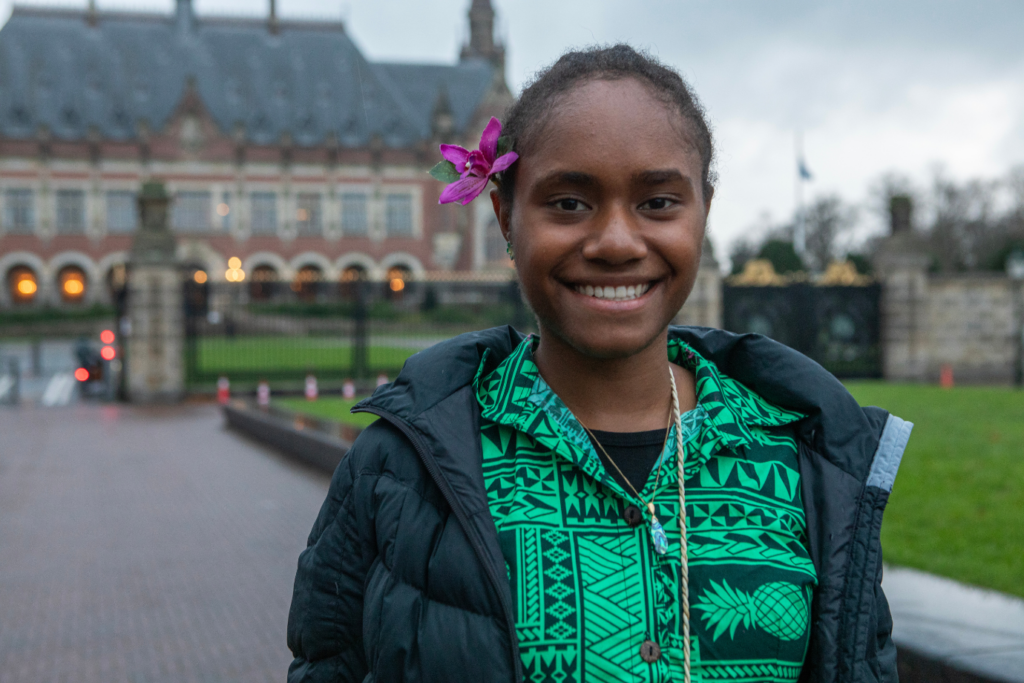The International Court of Justice is currently being asked to determine the responsibilities of nations to prevent climate change, and as I watch from the steps of the peace palace as a young person from the Pacific, I know whatever happens next has the potential to change my future, and the future of children across the Pacific and the world.
I come from Vanuatu, which is 15,608 km away from The Hague, where I currently find myself. Vanuatu is known for being a tropical paradise, and it’s true, it is really nice. But it is also a paradise that is also full of our culture and heritage, and it is slowly being taken away by a climate crisis we did not cause. However, I think more and more people are coming to learn that my home is one of the world’s most vulnerable countries when it comes to the climate crisis.
I celebrated my 16th birthday on the first day of the hearings, the same day that both Vanuatu and Australia presented their arguments to the court. While I was inspired by Vanuatu’s opening remarks, I was left disappointed by Australia. As a close neighbour of the Pacific Island nations Australia has a duty to stand with the Pacific and support what they are striving for here in The Hague, and for Australia to come here and completely go against that ambition, it’s very sad to see.
In my 16 years, I have not known a time where the threat of the climate crisis wasn’t real. As a young Ni-Vanuatu person, I feel the effects of climate change every day of every year. I’ve experienced many cyclones, and I can tell you, it can be utterly terrifying sometimes, especially the strong ones, that are becoming more and more frequent.
Every cyclone, our classrooms are destroyed, our homes are flattened to the ground, and hospitals and communication towers are ripped apart. And then there’s also the mental health impacts. We don’t really talk about it much, but these natural disasters can really cause anxiety in children and young people. This is my reality, and the reality of children not just in the Pacific, but across the world.
But it should not be our reality. Children and young people across my nation, the Pacific, and the world, should not be accepting these effects of climate change as a norm of life.
Just last year Vanuatu was devastated by back-to-back Category 4 Tropical Cyclones Judy and Kevin in March which affected more than 80% of the country’s population. I remember it so clearly. I remember the nights the cyclones hit us, like it was yesterday. You could just hear the iron sheets of the walls and roofing of corrugated iron houses, and you can just like hear them flying around. You shudder every time you hear a branch break or a tree crash to the ground. It’s scary and the place is pitch black and the wind is howling. We are just waiting for the storm to pass and see the damage left behind, wondering if this is our reality now.
I had hoped that we would have seen some climate justice at COP29, but I, and the young people of the Pacific and small island nations, were once again left disappointed. The outcome told us that high emitting countries don’t really care about our rights, that we aren’t worth more than just some empty promises. Climate change endangers our right to a safe childhood and prosperous future, not just for us but for our future generations who deserve to enjoy the exact same things we enjoy.
Being here in The Hague really brings home the scale of this climate emergency. I know that I am a part of a bigger movement by young Pacific people to get the world to act on climate. I am inspired by the tireless work of the Pacific Island Students Fighting Climate Change who spearheaded the move to have the ICJ provide an advisory opinion on the legal obligations of countries to take climate action, a move that was supported by the Government of Vanuatu, who I am here alongside.
I stand here, at the world’s highest court, as one of the many children and young people across the globe, who are striving for change, who are striving for equality, equity, and justice, and who are fighting for a brighter future for us all.
We are not just victims of climate change; we are the climate’s warriors. We have the power to mobilise, to amplify, to lead, and to influence decision making around the world. In the world we live in, government leaders and political leaders have lots of power, so I urge world leaders to listen more to youth from the Pacific and listen to other vulnerable nations in the face of the climate crisis. They need to make their decisions wisely, because it is our future ahead of us and it may be in jeopardy right now. As leaders and decision makers, it is time to step up and fulfil your promises. The time to act is now, because there is no time to waste.

